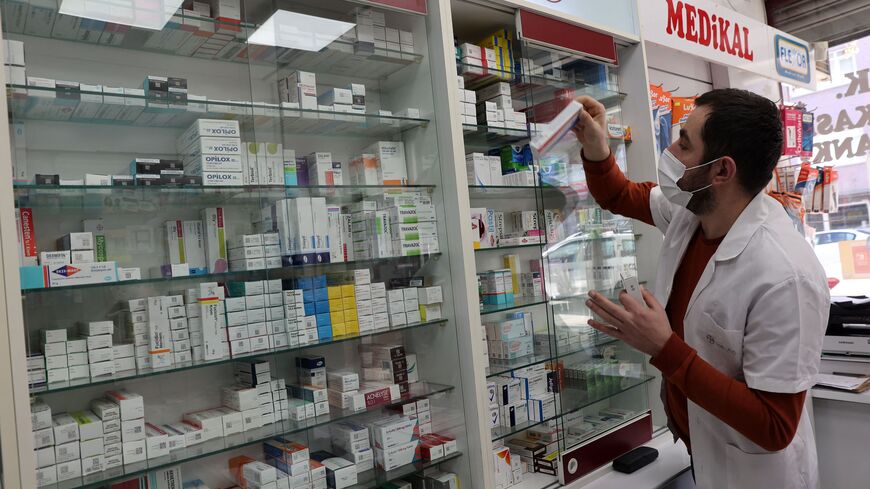ADANA — “They are out," said the father of a sick 4-year-old boy to his wife on the phone at a small pharmacy in Turkey’s southern province of Adana. He was desperate to find antibiotics for his son just a few days after a plane carrying 250,000 bottles of children's pain and fever relief medication from Turkey arrived in Canada to relieve the North American country of its drug shortage.
“Of course, I’m angry at the government,” Yusuf Hakverdi told Al-Monitor. “We went to four different pharmacies to find antibiotics. What good is the government?” he vehemently asked, adding that this was not the first time he was returning home empty-handed from a medicine hunt over the past year, echoing the outrage of millions.
Hakverdi’s struggle is shared by millions of Turks today who search pharmacy by pharmacy to find basic medicines for themselves or their loved ones amid Turkey's ongoing drug shortage crisis, which pharmacists' chambers say is a global problem worsened in Turkey with the lira’s devaluation, poor policy-making and especially the government-imposed euro-lira conversion rate, which still remains well below the real euro-Turkish lira parity.
In response to growing public unease, the Turkish government last month suspended the export of drugs that are considered “rare” until the countrywide problem is tackled. It also raised the euro-lira rate for imported medicine prices by 36.77% to 10.8 lira per euro last month in what Turkey’s Health Minister Fahrettin Koca said was the "first step for the solution of the medicine shortage in the market.”
Currency gap as lira plunges
However, the measures did little to ease the shortage. As the lira stands at 20.33 against the euro, importers continue to suffer from the wide currency gap, and without the proportional price hikes in place, local manufacturers won't produce enough for the local market, head of Adana Chamber of Pharmacists Mursel Yalbuzdag told Al-Monitor. “As a result, the incapacity for providing enough medicines to patients persists,” he said.
“Patients even give up on the pharmacies in their provinces and travel to other provinces seeking their medicine,” Yalbuzdag added, warning that if things continue like this, the drug shortage could turn into a drug famine in Turkey.
While a drug shortage hits Turkey each year around December to February due to drug companies' tactics to keep the products off the market until the new prices are determined in the New Year, Yalbuzdag — who has since 1999 owned a pharmacy in central Adana — described the current crisis as "an exceptional" one that is not stemmed from the seasonal trend but rather from a lack of reality-driven policy-making.
“The bottle itself costs more than the syrup product inside of it,” Yalbuzdag said, commenting on the hardship of producing for the local market amid skyrocketing inflation and devaluation of the lira, which has lost over 90% of its value against the dollar since 2008.
In early 2022, Georgian Prime Minister Irakli Garibashvili announced the start of medication imports from Turkey to reduce Georgia’s costs. He said last week that the move helped reduce medicine prices by 60% to 80% and saved Georgians 200 million laris (more than $75 million) annually.
There are ongoing drug shortages around the world, but in Turkey's case, the situation is direr mainly due to the government’s failure to update its medicine price list based on real economic conditions, according to Yalbuzdag.
As one in every four medicines remains unavailable in Turkey's pharmacies and one in every two pharmacies is at risk of shutting down, the Turkish Pharmacists' Association warns that the drug shortage could soon turn into a pharmacy shortage under current economic conditions.
Children's medicines, cancer drugs top the list
In all pharmacies Al-Monitor visited recently, the drug shortage was palpable. Children's medicines, antibiotics, fever reducers, allergy syrups, migraine medicines, some cancer drugs and imported medicines overall top Turkey's long-unavailable drug list, said an assistant pharmacist who asked to remain anonymous due to concerns of government pressure.
“Patients come here and we have to turn them down. We come at odds with the patients every day. We can't do our jobs properly,” the 37-year-old assistant told Al-Monitor. “Today, we turned down 10 patients. Sometimes, we tell all customers in a day we are out of at least one medicine they are seeking. … This situation is lowering my morale and separating me from my job."
In another pharmacy, the pharmacist was busy but pensive. Getting ready for the mandatory 24-hour pharmacy duty in the coming days, he was sorting the stocks to list what he had and what he needed, increasingly feeling insufficient over his lack of supplies.
In a fresh attempt to soothe nerves, Health Minister Koca announced this month that more drugs would be manufactured for the Turkish market to meet the demands. Still, no quick solution seems to be in sight for the country's drug shortage crisis.








